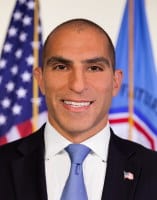
As 2024 draws to a close, Rostin Behnam, Chairman of the U.S. Commodity Futures Trading Commission, is focused on completing key rules regarding operational resilience, governance and conflicts of interest of here the end of the year.
Aside from the short-term to-do list, the regulator is working on a range of topics including political event contracts, decarbonization and cryptocurrency regulation.

Rostin Behnam, CFTC
Behnam took stock of the situation at the Bloomberg Global Regulatory Forum in New York on October 22, during a fireside chat moderated by Mary Schapiro, vice president of global public policy at Bloomberg.
Behnam discussed the CFTC’s ongoing legal challenges in political betting markets. “The Commission has been very consistent in its view for almost 10 to 15 years that event contracts on political events are illegal under U.S. law,” he said.
A lawsuit challenging this position was filed a year ago, resulting in a ruling against the CFTC in DC District Court. The Commission appealed the decision and requested a suspension of the contract list, which the appeal court rejected. The case is currently under review, with a final decision expected in the coming weeks or months; At the same time, regulated exchanges list contracts relating to political events, which Behnam says complicates the CFTC’s regulatory responsibilities.
Behnam expressed concerns that regulating betting markets “places the CFTC in the position of election cop.” He argued that contracts tied to political events expose the agency to risks related to investigating election-related claims, such as price manipulation based on false information or voting irregularities, which he described as “a bridge too far” for a market regulator.
According to Behnam, the CFTC’s long-standing stance against political betting markets has its origins in concerns that such contracts constitute gambling, which the Commission considers illegal under U.S. law because they violate state laws. of States and the public interest.
On climate action, Benham highlighted the CFTC’s work on voluntary carbon markets, which he sees as key to accelerating decarbonization.
Behnam discussed the Commission’s recent guidance on voluntary carbon markets which targets Designated Contract Markets (DCMs) listing carbon credit derivatives. “We were able to send a clear signal to the market that when you think about CFTC-listed futures contracts in voluntary carbon markets, we expect, from a regulatory perspective, that you use these principles as a benchmark for what you expect. of the underlying registry or institutions that issue the credits,” Behnam said. Addressing issues such as double counting and credit permanence are crucial to building market confidence and enabling the growth needed for decarbonization, he added.
As vice chair of the International Organization of Securities Commissions, Behnam discussed the CFTC’s collaboration with global regulators to establish best practices around voluntary carbon markets, working closely with the chair of the European Securities and Markets Authority, Verena Ross. He highlighted IOSCO’s role as a standard-setter and the hope that these practices will help national regulators implement effective policies. Behnam emphasized that decarbonization is a global problem that requires a global effort.
Regarding cryptocurrencies, Behnam outlined the CFTC’s current regulatory position and the loopholes he hopes Congress will close.
Behnam said that even though the CFTC began dealing in crypto futures in 2017, recalling that it first listed Bitcoin futures that year, much of the market remains unregulated, with hundreds, if not thousands, of tokens escaping current monitoring. He noted that while 60-70% of the market, primarily Bitcoin and Ether, are commodities under current law, the rest of the crypto market, representing perhaps $2 trillion in assets, is lacking comprehensive regulation.





